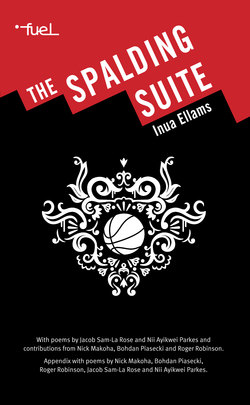Читать книгу The Spalding Suite - Inua Ellams - Страница 5
ОглавлениеFOREWORD
by Roger Robinson
Four Beginnings
1.
My first encounter with Inua Ellams was on a stage at the Albany theatre. A wiry young boy who couldn’t at the time have been more than eighteen. Before he came on I was already becoming bored of the endless parade of performers who either couldn’t write, couldn’t perform or even worse had no presence or heart on stage. I had long been on the lookout for young talent for no other reason than being able to pass on names to organisations to support them. Inua came on the stage with a passion so pure it was nearly luminescent. He was by far the best thing I had seen that night and by far the best thing I had seen that decade. On enquiry it became clear that I was not the only one who noticed judging by the crowd of people around him seeking out his contact details.
2.
The type of theatre that I have increasingly wanted to see, was a theatre that was modern, inclusive and relevant. As a theatre viewer I felt classic revivals, imported American narratives and novels adapted to theatre were becoming stale. The most interesting movements in theatre were not actually happening in the theatre. They had been happening over the past decade on the spoken word stages across the country. Just microphones, audiences, lyricism, story and human connection. These new breed theatre makers were inspired by all types of modern popular culture to create this new hybrid theatre form. They were taking elements from comics, stand-up comedy, hip hop, philosophy and documentaries. Emerging from this creative hotbed was Inua Ellams who took what he directly learned from this scene to the Edinburgh festival and was rewarded with a Fringe First for his show The 14th Tale catapulting to the forefront of the minds of the more traditional theatre community.
3.
Looking at an Inua Ellams theatre show whether he is performing in it or not, it is important (though not essential) to have some understanding of the concept of the griot, the traditional African oral historian who was not only the oracle of his tribe’s stories, but also held a pride of place because of his ability to understand the nature of human relationships; and could pull stories out that would encourage human empathy, and widen the scope of his people’s emotions. But to stop there would be to fall into a trap of identity and history, so you would have to go even further into his background as a graphic artist and designer. Anyone familiar with the surge of graphic novels as serious literature over the past two decades will see allegiances between that and the form that his performances take. Nearly at times feeling like a live graphic novel. The missing pictures in the frames are painted/spoken with meticulously chosen words that appeal to your senses so you see it, just as much as you hear it. But to stop there would be to fall into yet another trap, you still have to consider the music and cadence of his words. More specifically how they have been influenced by the context of hip hop, pop, soul and indie music. You also can’t stop there because you still have to take into account his love of poetry and his successful years on the tough, highly competitive performance poetry scene. Then there is his constant study of poets and poems from Rimbaud to Saul Williams, and then consider his knowledge of classical Greek myth, philosophy, politics and encyclopaedic knowledge of film. The wonder of Inua Ellams is how he pulls all these things together legibly to tell a story. But he does so seamlessly, and seemingly effortlessly.
4.
I was lucky enough to work with Inua Ellams at Spoke-lab at Theatre Royal Stratford East in 2009. Spoke-lab was an initiative started by myself and the director Dawn Reid to provide a safe space for the investigation and experimentation of spoken word within a theatrical context. Inua was there on time and prepared every week. We looked at work and got scraps of stuff up on the floor critiqued, praised and reworked. Inua took to the process easily but was always pushing himself and seemed to have a ceaseless flow of ideas streaming from him every week. I still remember though the day he stepped on to the floor and proceeded to play all the parts of a team in a basketball game where the crowd starts to jeer him with racist taunts and his white teammates were pulling together to fortify and protect him emotionally in the game. I was nearly moved to tears then, as I am now just thinking about it. It was very powerful, but what I saw was someone who found his voice in the theatre and it all seemed to coalesce (to me at least) in that space with that piece. I knew he’d go on to do great things in theatre and he did. So it is no surprise that a basketball show with all the power and emotion of what I saw in Spoke-lab some six years ago has come to fruition.
